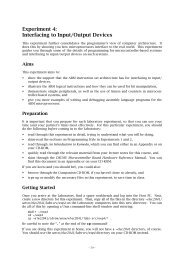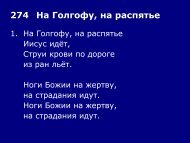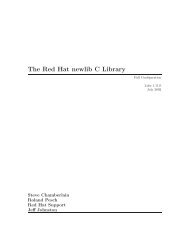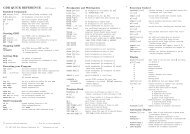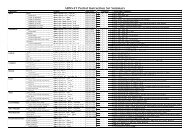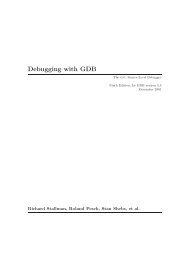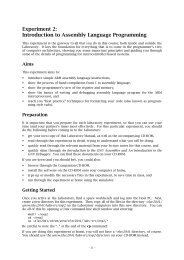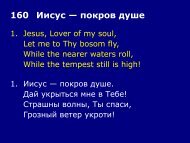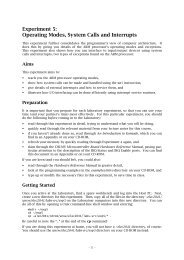The ARM-THUMB Procedure Call Standard
The ARM-THUMB Procedure Call Standard
The ARM-THUMB Procedure Call Standard
You also want an ePaper? Increase the reach of your titles
YUMPU automatically turns print PDFs into web optimized ePapers that Google loves.
<strong>The</strong> <strong>ARM</strong>-<strong>THUMB</strong> <strong>Procedure</strong> <strong>Call</strong> <strong>Standard</strong>To scope the problem, note that:oooooo<strong>The</strong> legacy issues concern:- <strong>The</strong> compatibility of register usage conventions between ATPCS and APCS/TPCS.- <strong>The</strong> compatibility of argument passing conventions between ATPCS and APCS/TPCS.- <strong>The</strong> suitability of argument passing conventions for old style C.<strong>The</strong> register usage conventions of the base standard are compatible with the most widely used variant of theAPCS (no frame-pointer, no stack checking) and the TPCS (no stack checking).<strong>The</strong> ATPCS register usage conventions for stack checking are compatible with APCS and TPCS.<strong>The</strong>re is neither legacy object code nor legacy assembly language for the VFP architecture, support for whichis new to ATPCS.Hitherto, the FPA architecture has been used relatively rarely. Software floating point (no floating-pointhardware) has been the norm.In the no-floating-point-hardware variants, the argument passing conventions are virtually unchanged fromthose of APCS and TPCS (but see section, 8.4.2, Narrow arguments, below).o In the no-floating-point-hardware variants, there are no problems with old style C (but see section, 8.4.2,Narrow arguments, below) because the argument passing method implicitly supports variadic functions.This effectively scopes the legacy problem to the problems of of:ooPassing floating point arguments in floating point registers (FPA and VFP variants).Passing narrow arguments.8.4.1 Floating point argument passing<strong>The</strong> FPA variant of the ATPCS is compatible with the APCS floating-point-arguments-in-floating-point-registersvariant.<strong>The</strong>re are no issues with the VFP and no-floating-point-hardware variants.<strong>The</strong> key problem is that of knowing when a called function is variadic because floating-point arguments must bemarshaled differently for such calls.ANSI C with prototypes, or C++<strong>The</strong>re is no problem. A language processor can always tell when a function is variadic.Old style C under the ANSI standardooo<strong>The</strong> ANSI standard does not allow a function declared in the old style to be variadic. This effectively requires aprototype for all user-defined variadic functions.<strong>The</strong> standard permits a language processor to recognize all standard library functions by name (pertinently,printf and friends), whether or not a prototype is in scope.<strong>The</strong> standard forbids user re-definition of any standard library function.Collectively, these edicts allow a language processor to handle old style C correctly provided:oo<strong>The</strong> language processor recognizes the variadic members of the C library by name.<strong>The</strong> user provides a proper prototype for every variadic function that can accept a floating-point argument.This is not particularly burdensome for users, remembering that there is a distinct performance advantage topassing floating-point arguments in floating-point registers.SWS ESPC 0002 A-05 Page 32 of 37



